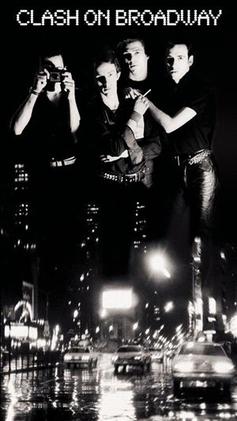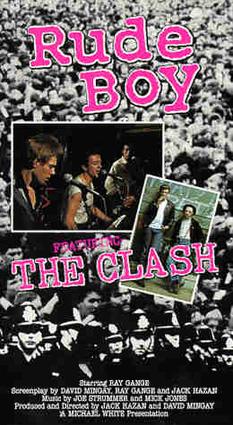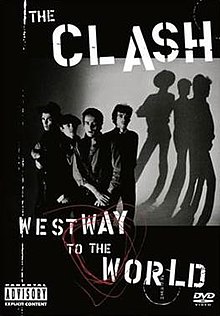
The Clash were an English rock band that formed in London in 1976 and were key players in the original wave of British punk rock. Billed as "The Only Band That Matters", they used elements of reggae, dub, funk, ska, and rockabilly, and they contributed to the post-punk and new wave movements that followed punk. For most of their recording career, the Clash consisted of lead vocalist and rhythm guitarist Joe Strummer, lead guitarist and vocalist Mick Jones, bassist Paul Simonon, and drummer Nicky "Topper" Headon.

Give 'Em Enough Rope is the second studio album by the English punk rock band the Clash, released on 10 November 1978 through CBS Records. It was their first album released in the United States, preceding the US version of the self-titled studio album. The album was well received by critics and fans, peaking at number two in the United Kingdom Albums Chart, and number 128 in the Billboard 200. The album is tied with Combat Rock (1982) for being the highest-charting album for the Clash in their native United Kingdom.

Paul Gustave Simonon is an English musician and artist best known as the bassist for the Clash. More recent work includes his involvement in the supergroup the Good, the Bad & the Queen and playing on the Gorillaz album Plastic Beach in 2010, which saw Simonon reunite with The Clash guitarist Mick Jones and Blur frontman Damon Albarn – and which also led to Simonon becoming the live band's touring bassist for Gorillaz's Escape to Plastic Beach Tour. Simonon is also an established visual artist.
The 101ers were a pub rock band from the 1970s playing mostly in a rockabilly style, notable as being the band that Joe Strummer left to join The Clash. Formed in London in May 1974, the 101ers made their performing debut on 7 September at the Telegraph pub in Brixton, under the name 'El Huaso and the 101 All Stars'. The name would later be shortened to the '101 All Stars' and finally just the '101ers'. The group played at free festivals such as Stonehenge, and established themselves on the London pub rock circuit prior to the advent of punk.

Combat Rock is the fifth studio album by the English rock band the Clash, released on 14 May 1982 through CBS Records. In the United Kingdom, the album charted at number 2, spending 23 weeks in the UK charts and peaked at number 7 in the United States, spending 61 weeks on the chart. The album was propelled by drummer Topper Headon's "Rock the Casbah" which became a staple on the newly launched MTV. Combat Rock continued the influence of funk and reggae like previous Clash albums, but also featured a more radio-friendly sound which alienated Clash fans. While the recording process went smoothly, the producing process of the album was tiring and full of infighting between Mick Jones and Joe Strummer. Headon's heroin addiction grew worse and he slowly became distant from the band while Strummer and bassist Paul Simonon reinstated Bernie Rhodes as manager, a move unwelcomed by Jones. The band had disagreed on the creative process of the album and called in Glyn Johns to produce the more radio-friendly sound of Combat Rock. Lyrically, Combat Rock focuses on the Vietnam War, postcolonialism, the decline of American society, and authoritarianism.

Nicholas Bowen "Topper" Headon is an English drummer and multi-instrumentalist, best known as the drummer of punk rock band The Clash. Known for his contributions to the drumming world, Headon was inducted in the Rock and Roll Hall of Fame with the rest of The Clash in 2003.

"Rock the Casbah" is a song by the English punk rock band The Clash, released in 1982 as the second single from their fifth album, Combat Rock. It reached number eight on the Billboard Hot 100 chart in the US and, along with the track "Mustapha Dance", it also reached number eight on the dance chart.

Michael Geoffrey Jones is a British musician, singer, songwriter, and record producer best known as the co-founder of the Clash, and as that group's guitarist until 1983. In 1984, he formed Big Audio Dynamite with Don Letts. Jones has played with the band Carbon/Silicon along with Tony James since 2002 and was part of the Gorillaz live band for a world tour in 2010–2011. In late 2011, Jones collaborated with Pete Wylie and members of the Farm to form the Justice Tonight Band.

"(White Man) In Hammersmith Palais" is a song by the English punk rock band the Clash. It was originally released as a 7-inch single, with the b-side "The Prisoner", on 16 June 1978 through CBS Records.

Donovan Letts is a British film director, disc jockey (DJ) and musician. Letts first came to prominence as the videographer for the Clash, directing several of their music videos. In 1984, Letts co-founded the band Big Audio Dynamite with former Clash lead guitarist and co-lead vocalist Mick Jones, acting as the band's sampler and videographer before departing the band in 1990.

The discography of the British punk rock band the Clash consists of six studio albums, two extended plays, two live albums and 31 singles.

"Complete Control" is a song by The Clash, released as a 7" single and featured on the U.S. release of their debut album.

Clash on Broadway is a box set compilation album by the English punk rock band the Clash, released on Legacy Records in 1991. It comprises 64 tracks on three compact discs, spanning the time period from their 1977 debut single, "White Riot", through the Combat Rock album of 1982. It does not include material from the band's final sessions led by Joe Strummer and Paul Simonon, resulting in the final album Cut the Crap (1985). It was initially released in longbox form.

Rude Boy is a 1980 British film directed by Jack Hazan and David Mingay and filmed in 1978 and early 1979.
"I'm So Bored with the U.S.A." is a song by British punk rock band the Clash, featured on their critically acclaimed 1977 debut album, which was released in the United States in July 1979 as their second album after Give 'Em Enough Rope. It was the album's third track in the original version and second in the US version.
Bill Price was an English record producer and audio engineer who worked with the Clash, the Sex Pistols, Guns N' Roses, Sparks, the Jesus and Mary Chain, Nymphs, the Waterboys, Mott the Hoople and Simon Townshend. He was chief engineer on the first three solo studio albums by Pete Townshend: Empty Glass (1980), All the Best Cowboys Have Chinese Eyes (1982) and White City: A Novel (1985).
"Janie Jones" is a song by the English punk rock band the Clash. It is the opening track on their debut album, The Clash (1977). The song is named after Janie Jones, a cabaret singer who organised sex parties at her Kensington home.
The Clash were an English rock band that formed in 1976 as part of the original wave of British punk rock. Along with punk rock, they experimented with reggae, ska, dub, funk, rap and rockabilly. For most of their recording career, The Clash consisted of Joe Strummer, Mick Jones, and Paul Simonon, with Terry Chimes or Nicky "Topper" Headon on drums and percussion. The band features in several documentaries and other films.
"Garageland" is a song by English punk rock band The Clash featured as the final track for their 1977 debut album The Clash.












